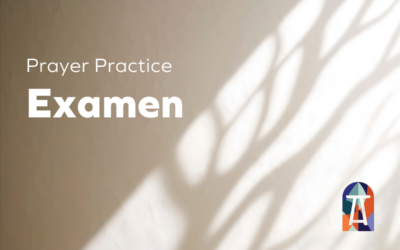“Reconciliation is Spiritual Formation” Captures Arrabon’s Ethos
How do we move from words to action when it comes to reconciliation?

Share this Article
With conversations about race happening from halls of Congress to our kitchen tables, some of the questions we as believers need to ask are: How do we move from words to actions when it comes to racial reconciliation? And what does that look like practically and spiritually?
Arrabon founder, David M. Bailey, offers a framework for doing this in “Reconciliation is Spiritual Formation,” an article in the Spring 2021 issue of Comment. Both personal and pastoral, the piece maps the steps for becoming an agent of change and explores five pillars for building a reconciling community. If you haven’t had a chance to read it, it’s definitely worth your time.
We asked Comment Editor-in-Chief Anne Snyder to share why she commissioned David to write the article and the ways she sees Arrabon’s work influencing our cultural moment now—and in the not yet.
How did you first hear about Arrabon and what resonated with you about our mission and work?
When I became editor of Comment in the fall of 2019, I gave a talk that expressed my vision for the magazine: honoring its past but also widening who gets to speak as an “influencer” Christianly speaking, as well as more broadly culturally speaking. I feel part of my life mission is to build bridges between these worlds that never interact with each other.
A mutual friend of David and mine heard the talk and emailed to introduce us. We got to know each other at a couple of conferences we were both a part of.
I’ve spent a lot of my career studying how an organization forms and transforms someone’s character across a wide range of sectors and demographics. Arrabon is equipping organizations to be healthier, ultimately honing in on the core Christian act of reconciliation and a reconciled community, Everything about that just sang all of my chords. I was intrigued to learn more at the level of praxis around a subject area that is core to my own dream for God’s world.
Arrabon is equipping organizations to be healthier, ultimately honing in on the core Christian act of reconciliation and a reconciled community, Everything about that just sang all of my chords.”
What prompted you to reach out to David to write this piece? What about Arrabon’s approach did you feel was important for your readers to understand? What felt important for you, personally?
The theme of this particular issue was around the dynamics of moral agency. We talk so much about systemic morality. How do we talk about individual moral formation and virtue? I’m convinced that you can’t really tell where one ends and the other begins. David came to mind because of Arrabon’s work. I was very interested in having someone steeped theologically in practices of reconciliation walk through the steps required to get to a place of true reconciliation, which is ultimately a move of the Holy Spirit. I feel like you guys get this. You understand that institutions form people and people form institutions, for good and for ill.
An important task of the maturing person is to seek understanding of how the various institutions we are a part of have shaped us—both in their unique gifts and in their unique brokenness.”
A lot of white folks have been awakened to injustices that tear at their souls. They’re yearning for reconciliation and just want to get there. They just want to get to Resurrection Sunday but don’t want to patiently wait through the awfulness of Holy Saturday and the death of Good Friday. Arrabon, with great grace, great spiritual maturity, and great skill, goes into all kinds of contexts and helps people understand the true steps required. I wanted David to name what those steps are and weave in his expertise, what he has observed, and his own personal story.
Why do you think Arrabon’s mission and work is particularly valuable now?
I think we exist in such a fraught time where everyone distrusts everyone. There are huge powerful narratives swirling all around us that are fueled by a lot of self righteousness on all sides, right and left. Power is really suspect. Our debates are stuck in this high level of symbolic abstractions. People can get paralyzed by what they know they shouldn’t do or shouldn’t say.
There’s something about Arrabon’s mission and work that is realistic about the sinful world we live in and is also very attuned to the dynamics of how culture shapes people. I really appreciate the anthropological fluency of Arrabon, that you understand we do not exist in a vacuum as individuals.There’s also a bridge building element about David. He has a healthy sense of humor about things that seem like they divide us irrevocably. There’s also deep baptism into God’s logic of how we humble ourselves and can come to see a much greater truth about the nature of His love, which then informs the nature of our love for others.
When we receive the invitation from God to engage the brokenness of our world in a transformative way from the inside out, we are formed spiritually in a way that forms us more in the likeness of Christ.”
I think Arrabon’s work is vital because it’s actually equipping organizations—where a lot of these battles take place—with the language, tools, posture, and hope that they don’t have to stay stuck in this deeply divided, human-dignity-defying or -reducing stance.
How was your experience working with David on the article? Were there any “a-ha” moments or areas that required pressing in?
It was a total joy working with David. I pitched the piece to him out of deep respect for his earned wisdom from the trenches and his praxis inflected by mature theological insight. My whole goal was to convert the toolkit he gives to other organizations into prose that would flow beautifully and would also highlight the wisdom of his work over the years, and to do it in such a way that situates it within the larger cultural questions of our moment.
When I’m really loving working on a piece, I feel like I’m in dialogue with the author. There were many moments of feeling like I was in a classroom of Arrabon’s own super powers. The editing work, whether I was overwriting a sentence or asking David to flesh something out, was really a back and forth between me the student and him the teacher.
He highlights so many insights around the stages of institutional maturity and culture change within an organization. His words are gentle and compassionate in describing how we’re shaped by our environments while also challenging the reader to understand his or her own agency, particularly our moral responsibility if you’re a Christian, navigating all of these fraught lines of difference.
Honestly, this particular piece just flowed. You know you have those dialogues with someone and you start to feel like you’re both discovering truth together and you can’t quite figure out where your interlocutor’s ideas begin and yours end? That’s how it felt.
Related Reading
A Posture of Compassionate Curiosity | Passing the Peace
We hope this tool can be used to encourage reflection, integration, and humble pursuit of the Way of Jesus.Each day is filled with joys, challenges, and mundane moments. It is our hope that you have found this prayer to be a helpful way to slow down, listen and...
A Prayer of Examen for Pursuing Shalom Amidst Division | Passing the Peace
We hope this tool can be used to encourage reflection, integration, and humble pursuit of the Way of Jesus.



